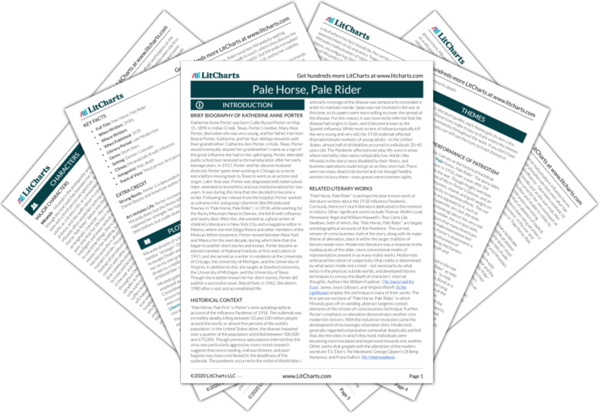Miranda dreams of a familiar bed, a familiar house, and a familiar “stranger.” On a gray horse, she embarks on a journey to escape Death and the Devil and the stranger rides beside her on his own gray horse. Miranda wakes from her troubling dream to a reality equally as troubling: the world is in the midst of World War I and the influenza pandemic.
Miranda goes to work at the newspaper office where she is employed as a drama critic. At the office, there are two Lusk Committeemen (temporary government employees who ensure loyalty during wartime) waiting for her at her desk. The men confront Miranda and harass her for not purchasing a Liberty Bond to support the war effort. Miranda refuses to buy one and is tempted to reject the war entirely.

The narrative jumps forward as Miranda is back home, exhausted and relaxing in the bath. She has a horrible headache and thinks back at what might have caused it. She remembers what occurred yesterday after the committeemen left: Mary Townsend (Towney) and Miranda anguished over what could be done to them for not buying bonds, and Miranda left work to visit the wounded soldiers in the hospital—a task she dreads and finds phony and forced.
The narrative shifts back to the present, where Miranda wraps up her bath and daydreams about Adam Barclay, her love interest. Adam, a young soldier, moved into Miranda’s building the week before and the two have seen each other nonstop over the past 10 days. Adam surprises Miranda by waiting outside her door. The two walk to lunch, where they discuss the war and the flu. The outing is romantic, but Miranda is troubled by an increasing fear that she is growing ill and by her inability to fully connect and relate to Adam.
Later, at work, Miranda discusses the war with her work friends Towney and Chuck Rouncivale. Everybody has a lot to say, but none of them manages to say how they really feel about the war and their roles in it. After work, Chuck and Miranda attend a show she must cover for the paper. An actor for whom Miranda gave a less than stellar review confronts the pair outside the theatre. Miranda feels badly about the encounter, and on top of this, the show is rotten. Echoing her strange dream and anxieties during her outing with Adam, Miranda continues to feel as though something bad is going to happen to her.
Later on, Miranda waits for Adam so they can spend the evening together. While she waits, Miranda questions the significance of her relationship with Adam in light of the uncertain fate his role in the war presents for him. Adam and Miranda see a horrible show together. A man trying to push bonds on the audience interrupts the show before its third act. Miranda is disgusted by the man’s theatrical sales pitch, though Adam is more sympathetic. They leave the show to go dancing.
The next thing Miranda knows, she is delirious and sick in bed. Adam arrives and cares for her. The couple sings and prays together while Miranda slips in and out of deliriousness. They admit their love for one another before Adam leaves to bring back ice cream and hot coffee. Miranda falls asleep, and wakes up to find herself in a hospital, and Adam gone.
In the hospital, Miranda slips in and out of consciousness, dreaming of death, oblivion, and utopia. At first Miranda is afraid of death and the eternity of darkness it presents, but her vision pulls her in different, more hopeful direction. The darkness changes to light, and Miranda sees the familiar faces of people close to her who had died. This utopic, beautiful dreamscape presents a world in which Miranda is able to fully connect with and be understood by others—something of which she has never before been capable.
Miranda eventually regains consciousness. She learns that World War I has ended and that she is on the road to recovery. She discovers that Adam was called to duty and died of influenza in a military camp hospital. Towney and Chuck come to see her bringing with them letters from friends who are overjoyed to hear that Miranda is no longer ill. Everybody wants Miranda to be overjoyed at her miraculous recovery, and she knows she should be. Yet, Miranda cannot forget the ethereal images of eternity and connection that she glimpsed in her dream. The conscious, real world—and all of its death and misery—is dreary and grim in comparison to this impossible world of the sublime she hallucinated. Though Miranda knows she should be happy to be alive, she is overcome with grief and dejection.







